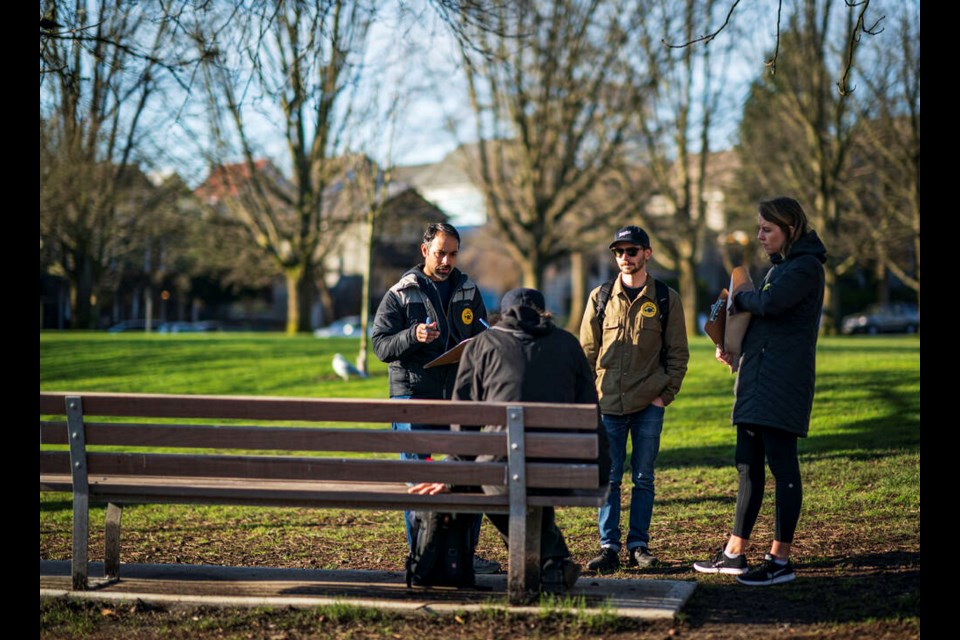Some people living homeless on the North Shore can be found living in RVs on back streets near the malls. Others are farther off the grid, camped out in tents hidden by bushes in local parks. Some are hidden in plain sight, crashing on a succession of friends’ couches.
Finding out just how many people on the North Shore struggle with lack of regular shelter, and why, are the questions behind Metro Vancouver’s homeless count, which took place March 8 on the North Shore — the first time the count has been held since 2020.
Thirty trained volunteers fanned out across North Vancouver and West Vancouver with the goal of counting people they encountered who were experiencing homelessness and asking questions aimed at giving a clearer picture of the issue in each community.
Questions included how long people have been living in the community, how long they’ve been homeless, what caused them to lose their most recent housing, whether they have sources of income, their race, gender identity and sexual orientation and whether they have a partner or children.
The last count in 2020 tallied 121 people who were homeless on the North Shore – a number that’s increased slightly, but remained relatively stable for about the past decade.
Advocates all acknowledge, however, that number is likely a significant “undercount."
People who are homeless on the North Shore, for instance, may end up having to go to other communities to access services, including temporary shelter, resulting in them not showing up in official count numbers, said Dr. Alex Choi, the North Shore’s medical health officer.
Youth and women also tend to be under-counted in official numbers, said Choi.
Official numbers from the count won’t be available until fall, but Choi said the difficulty of finding affordable housing on the North Shore has continued to grow over the past three years.
Of local residents who responded to Vancouver Coastal Health surveys, between 26 and 28 per cent said it was more difficult than it was previously to meet their financial needs and between one and two per cent reported having to move because they couldn’t afford the cost of housing.
Both the number of youth and the number of people over 55 who are homeless has been increasing on the North Shore, said Choi.
About 25 per cent of people who said they were homeless in the 2020 count were over 55.
A higher number of people counted on the North Shore are also “unsheltered” compared to the homeless population in other parts of the Lower Mainland, said Choi, meaning they are camped out in the bush, living in vehicles or couch surfing, rather than staying at a shelter.
About 38 per cent of the North Shore’s homeless population is “unsheltered” compared to 28 per cent in Greater Vancouver as a whole.
About 21 per cent of homeless people on the North Shore are also working in some capacity, said Choi.
Most recently, provincial funding has allowed for hiring of additional outreach workers on the North Shore, through joint efforts between the Lookout Housing and Health Society, which runs the local emergency shelter and extreme weather shelters, local municipalities and : Sḵwx̱wú7mesh Úxwumixw (Squamish Nation) and Tsleil-Waututh Nation.
Shower programs operate at the John Braithwaite Community Centre and the West Vancouver Community Centre. The City of North Vancouver also operates an “Open Door Community Hub” at the city library, which provides activities and a welcoming space for anyone who wants to drop in.
Care packages with items like healthy snacks, hygiene supplies, fresh socks and weather-appropriate gear are available for free and people attending the program can also get referrals to other community service organizations.
The program started in November of 2021. In 2022, there were approximately 2,200 visits over 79 drop-in sessions, for an average of 27 visits per session, according to the city.



